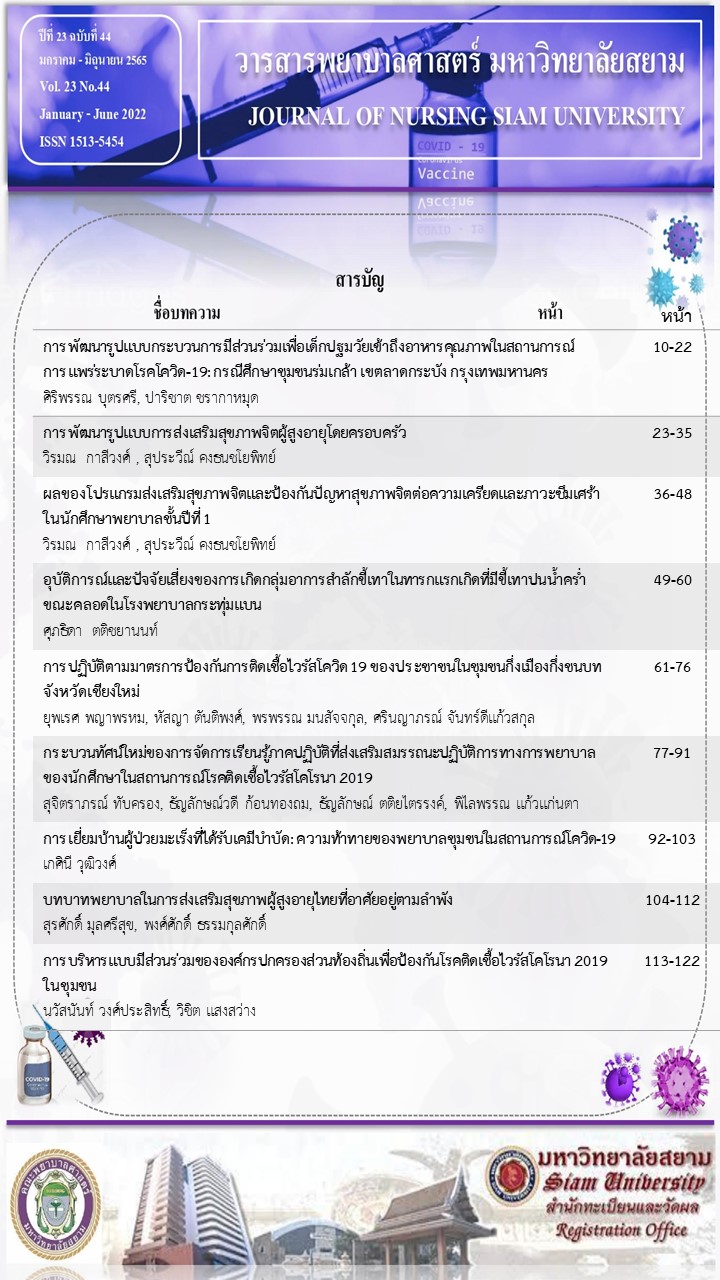การพัฒนารูปแบบกระบวนการมีส่วนร่วมเพื่อเด็กปฐมวัยเข้าถึงอาหารคุณภาพในสถานการณ์การแพร่ระบาดโรคโควิด-19 : กรณีศึกษาชุมชนร่มเกล้า เขตลาดกระบัง กรุงเทพมหานคร
คำสำคัญ:
กระบวนการมีส่วนร่วม, การเข้าถึงอาหารคุณภาพของเด็กปฐมวัยบทคัดย่อ
การวิจัยเชิงปฏิบัติการแบบมีส่วนร่วมนี้ วัตถุประสงค์เพื่อศึกษากระบวนการสร้างการมีส่วนร่วมและพัฒนารูปแบบเพื่อเด็กปฐมวัยเข้าถึงอาหารคุณภาพในสถานการณ์การแพร่ระบาดโรคโควิด-19 กลุ่มตัวอย่าง คือ เด็กปฐมวัยชุมชนร่มเกล้า จำนวน 200 คน ใช้เครื่องมือวิจัยเชิงคุณภาพ การสัมภาษณ์เชิงลึก แบบสอบถามแบบกึ่งมีโครงสร้าง การสนทนากลุ่ม เป็นต้น ผลการวิจัยพบว่า เด็กปฐมวัยในชุมชน ได้รับการสนับสนุนให้เข้าถึงอาหารคุณภาพ และติดตามเยี่ยมบ้านเฝ้าระวังภาวะโภชนาการและส่งเสริมพัฒนาการ การอบรมเลี้ยงดูเด็กที่ถูกต้องโดยผู้ปกครองมีส่วนร่วม ผลลัพธ์ของรูปแบบกระบวนการมีส่วนร่วมโดยใช้ชุมชนเป็นฐาน ผู้มีส่วนร่วมมีการพัฒนาความสามารถในการแก้ปัญหา โดยการนำทรัพยากรจากชุมชนทุนมนุษย์และสังคม ค้นหาผู้รอบรู้ และกระตุ้นการมีส่วนร่วมจนสามารถจัดทำกลไกขับเคลื่อน ทำแผนสู่การปฏิบัติอย่างเป็นรูปธรรม จากการถอดบทเรียน พบว่า ปัจจัยความสำเร็จคือ การสร้างกลไกการมีส่วนร่วมของภาคีเครือข่ายระดับพื้นที่เชื่อมร้อยกับระดับนโยบาย ทำให้ชุมชนได้รับงบประมาณและการสนับสนุนเชิงวิชาการจากภาคีเครือข่ายที่เกี่ยวข้องทั้งภาครัฐและเอกชน ผลจากการขับเคลื่อนในชุมชนร่มเกล้า เป็นจุดเริ่มต้นให้ศูนย์พัฒนาเด็กก่อนวัยเรียน สำนักพัฒนาสังคม กรุงเทพมหานคร สามารถเปิดจัดอาหารกลางวันและอาหารเสริม(นม)แก่เด็ก เป็นกรณีพิเศษ ทำให้เด็กเข้าถึงอาหารกลางวันคุณภาพครอบคลุมพื้นที่เขตสุขภาพที่ 13
เอกสารอ้างอิง
กรมสุขภาพจิต. (2564). ก้าวผ่าน 9 วิกฤติโควิด สู่โอกาสการพัฒนาเด็กและครอบครัว. เข้าถึงได้จาก https://www.dmh.go.th/news-dmh/view. asp?id=31163
กรมควบคุมโรค. (2564). สถานการณ์ COVID-19. เข้าถึงได้จาก https://ddcportal.ddc.moph.go.th/portal/apps/opsdashboard/index.html#/20f3466e075e45e5946aa87c96e8ad65
ชมพูนุท โตโพธิ์ไทย ฐิติกร โตโพธิ์ไทย ปารีณา ศรีวนิชย และเอกชัย เพียรศรีวัชรา. (2564). การบริหารจัดการเพื่อแก้ปัญหาเกี่ยวกับการให้อาหารแก่ทารกและเด็กเล็กในสังคมไทยระหว่างการแพร่ระบาดของโควิด-19. วารสารวิจัยระบบสาธารณสุข, 15(1), 66-88.
รัถยานภิศ พละศึก, เบญจวรรณ ถนอมชยธวัช และ ดลปภัฎ ทรงเลิศ. (2564). การวิจัยเชิงปฏิบัติการแบบมี
ส่วนร่วม: กระบวนการพัฒนาการสร้างเสริมสุขภาพชุมชนอย่างมีส่วนร่วม. วารสารเครือข่ายวิทยาลัยพยาบาลและการสาธารณสุขภาคใต้, 5(1), 211-223.
รุจา ภู่ไพบูลย์ สุริยพงศ์ วัฒนาศักดิ์ นารีรัตน์ จิตรมนตรี มณี อาภานันทกุล อาภา ยังประดิษฐ์ นิตยา สินสุกใส และราตรี ภูศรี. (2555). กระบวนการพัฒนาสุขภาพพอเพียงในชุมชน. วารสารพยาบาลศาสตร์และสุขภาพ, 35(1), 28-38.
สุภางค์ จันทวานิช. (2547). การวิเคราะห์ข้อมูลในการวิจัยเชิงคุณภาพ. พิมพ์ครั้งที่ 6. สำนักพิมพ์แห่ง จุฬาลงกรณ์มหาวิทยาลัย.
สำนักงานคณะกรรมการพัฒนาการเศรษฐกิจและสังคมแห่งชาติ. (2561). ยุทธศาสตร์ชาติ พ.ศ.2561-2580. เข้าถึงได้จาก http://www.ratchakitcha.soc.go.th/DATA/PDF/2561/A/082/T_0001
สำนักงานปลัดกระทรวงสาธารณสุข. (2563). แผนปฏิบัติการกลุ่มวัยกระทรวงสาธารณสุข พ.ศ. 2563-2565. พิมพ์ครั้งที่ 1. กรุงเทพฯ: กองบริหารการสาธารณสุข.
ศรีเมือง พลังฤทธิ์ อลิสสา รัตนตะวัน และชุมพจน์ อมาตยกุล. (2554). การเสริมสร้างพลังโดยการมีส่วนร่วมของชุมชนในการสร้างทีมสร้างเสริมสุขภาพที่เข้มแข็ง หมู่ที่ 3 ตำบลคูคต อำเภอลำลูกกา จังหวัดปทุมธานี.วารสารสมาคมพยาบาลฯ สาขาภาคตะวันออกเฉียงเหนือ, 29(4), 256-267. (in Thai).
ศิริกัญญา ฤทธิ์แปลก. (2559). การพัฒนารูปแบบการส่งเสริมพัฒนาการเด็กอายุ 1–3 ปี โดยครอบครัวและชุมชนมีส่วนร่วมกรณีศึกษาชุมชนตําบลบ้านยาง อําเภอเมือง จังหวัดบุรีรัมย์. วารสารวิจัยและพัฒนา มหาวิทยาลัยราชภัฏเลย, 11(พิเศษ), 99-109.
สำนักงานสถิติแห่งชาติ. (2563). โครงการสำรวจสถานการณ์เด็ก และสตรีในประเทศไทย พ.ศ. 2562, รายงานผลฉบับสมบูรณ์. กรุงเทพมหานคร : สำนักงานสถิติแห่งชาติ ประเทศไทย.
องค์การยูนิเซฟ. การพัฒนาเด็กปฐมวัยขององค์การยูนิเซฟ. (2563). เข้าถึงได้จาก http://www.unicef. org/thailand/th/ภารกิจของยูนิเซฟ/การพัฒนาเด็กปฐมวัย
Crane & O’Regan. (2010). On PAR Using Participatory Action Research to Improve Early Intervention. Department of Families, Housing, Community Services and Indigenous Affairs, Australian Government.
ดาวน์โหลด
เผยแพร่แล้ว
รูปแบบการอ้างอิง
ฉบับ
ประเภทบทความ
สัญญาอนุญาต
ลิขสิทธิ์ (c) 2022 วารสารพยาบาลศาสตร์ มหาวิทยาลัยสยาม

อนุญาตภายใต้เงื่อนไข Creative Commons Attribution-NonCommercial-NoDerivatives 4.0 International License.
เนื้อหาและข้อมูลที่เผยแพร่ในวารสารพยาบาลศาสตร์ มหาวิทยาลัยสยามถือเป็นข้อคิดเห็นและความรับผิดชอบของผู้นิพนธ์บทความโดยตรง
บทความ เนื้อหา ข้อมูล รูปภาพ ฯลฯ ที่ได้รับการเผยแพร่ในวารสารพยาบาลศาสตร์ มหาวิทยาลัยสยาม ถือเป็นลิขสิทธิ์ของวารสารพยาบาลศาสตร์ มหาวิทยาลัยสยาม หากบุคคลหรือหน่วยงานใดต้องการนำทั้งหมดหรือส่วนหนึ่งส่วนใดไปเผยแพร่หรือเพื่อกระทำการใด ๆ จะต้องอ้างอิงวารสารพยาบาลศาสตร์ มหาวิทยาลัยสยามทุกครั้ง



